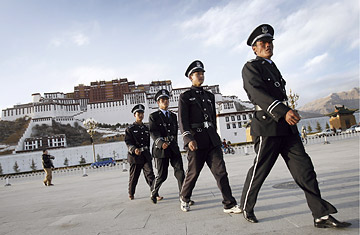
Chinese security officers patrol the square by the Potala Palace in Lhasa, Tibet.
Cyberspace in China is a rough-and-tumble place, where mobs of virtual vigilantes can single out an innocent victim for public humiliation in a way that isn't common in other parts of the world. But in recent days the sights of China's netizens have been trained not on a person but on an institution: the Western media, which is being vilified as unfair, uninformed and incompetent in its coverage of the uprisings over Chinese rule in Tibet. In blogs, chatrooms, bulletin boards and even by instant message, ordinary Chinese are excoriating the international press. There's even a special website that has been launched to attack perceived media bias. Among other transgressions, the site's home page displays mistakes by German TV stations in which Nepalese police, shown in videos rounding up Tibetan protesters in Kathmandu are identified as Chinese.
"This is a struggle against Western hegemony," writes Rao Jin, a young Beijing businessman who set up the site. "The time has passed when the Western countries could try covering the sky with the lies of a few filthy mouthpieces."
Such sentiments are music to the ears of the Chinese government. Beijing has been conducting its own media attacks in an effort to blunt the global criticism for its dispatching of thousands of troops to Tibet and ethnically Tibetan areas of China to crack down on the protests that have roiled the region over the past two weeks. China's leaders fear the atmosphere surrounding the summer Olympic Games in Beijing will be poisoned by bad publicity after the riots and demonstrations. So the state-controlled media has gone into spin-control mode, portraying the events in Lhasa as race riots rather than demonstrations for Tibetan independence. TV stations have repeatedly broadcast videos of Tibetans looting Chinese shops and mugging Chinese passersby. Chinese newspapers have been filled with accounts of innocent ethnic Chinese killed in Lhasa by rampaging Tibetans, stories such as the burning to death of five young girls and a baby in a garage, and of a Chinese woman who had an ear cut off by protesters. The blitz has been working. Beijing has, to an extent, put its stamp on how these events play outside China. That may prove to be a milestone for a country better known for blank-faced stonewalling than sophisticated spin.
Of course, the cadres who manage the news have an advantage when it comes to swaying domestic opinion. Any questioning of China's sovereignty over Tibet is guaranteed to inflame the patriotic sentiments of millions of Chinese. The issue taps into a complex area of the Chinese psyche, a place where swelling national pride over the country's phenomenal economic growth intersects with a lingering bitterness over the way the Middle Kingdom was treated by the West in the century and a half leading up to the communist takeover in 1949. It's still not uncommon for foreign visitors to be subjected to lengthy lectures on the evils of colonialism and the humiliation China suffered during the Opium Wars of the mid-1800s and the suppression of the Boxer Rebellion by British, French and German forces in 1900.
Beijing has proved adept at tapping into that vein of anger, be it over the accidental U.S. bombing of the Chinese embassy in Belgrade in 1999 or the crash of a Chinese fighter jet after a mid-air collision with a U.S. surveillance aircraft two years later. But what's different, this time, is that Beijing — with the help of citizens like Rao — has managed to influence foreign media coverage. In one example, the Washington Post amended a slideshow on its website after Chinese bloggers complained that a photo of a police crackdown in Nepal was associated with events in Tibet. The newspaper corrected the slideshow and noted online that a mistake had been made. Both the Post and the Wall Street Journal have published articles about the Chinese allegations of Western media bias.
In its handling of Tibet, Beijing has demonstrated that it is growing more adroit at managing potentially negative news stories. But it remains to be seen how long China can turn the discussion away from its own conduct in Tibet. Even President George Bush seems to be urging moderation, after trying to steer clear of the Tibet controversy, remaining largely silent while Democrats on Capitol Hill and the candidates trying to replace him have criticized China's handling of the uprising. Last month he said he intended to go to the Olympics in August regardless of unrest and human rights concerns in China. "I'm going to the Olympics," the President said after Steven Spielberg cut his ties to the Games. "I have a little different platform than Steven Spielberg, so I get to talk to President Hu Jintao." Bush exercised that prerogative on Wednesday morning, calling Hu and raising "his concerns about the situation in Tibet," according to White House Press Secretary Dana Perino. Bush "encouraged the Chinese government to engage in substantive dialogue with the Dalai Lama's representatives and to allow access for journalists and diplomats."
For the moment, however, China's ethnically Tibetan areas are almost completely off-limits to foreign reporters. Beijing seems to want to, as the Chinese say, bimendagou — close the door and beat the dog, away from the prying eyes of neighbors. But unless they plan to keep that door shut until after the Olympic Games in August, reporters will eventually get back in. Maybe then we'll be able to say — without bias — just what has been going on behind closed doors. With reporting by Massimo Calabresi/Washington
